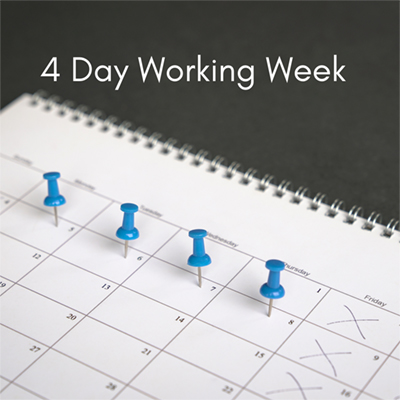Earlier this year, a number of businesses entered trials into a 4-day working week, with no reduction in pay or output, just a 20% reduction in hours. Sound a bit out there? What do you think about this?
Well, believe it or not many businesses believed the shift to the now 5-day week Monday to Friday was out there when that was introduced almost 100 years ago!
For me, the Mon-Fri 9am-5pm is outdated, things have moved on so much over the last 100 years and it does feel we’re trying to fit a square peg in a round hole by sticking to that tradition. People work all different hours now, the online world means you can buy at any time of the day or night, and I do think as businesses, we have to move with the times.
Change can be scary, especially as we’re in a cost-of-living crisis and now, more than ever we need to be as productive as we can be. Technology advances and covid has changed our working landscape, some may say for the better with the introduction of more flexible agile working options to industries that may never have considered them prior.
It has also shown that efficiency and productivity can increase even when employees are working remotely. Employees have witnessed the benefit of a more positive work-life balance and this new proposal can further those benefits for all.
Offering an option for employees to work on full pay, for 80% of the time and to produce 100% outputs (or more) where possible, is just an added benefit to have in your toolkit. As a nation we are one of the least productive economies and so allowing your employees extra time to rest can help support an increase in productivity when they return. I think the more businesses can assist in giving employees a decent work-life balance along with decent pay, the more loyal and productive those employees are going to be.
Companies like Microsoft have seen 40% increase in productivity by adopting a 4-day week, others have seen huge improvements in wellbeing, reductions in carbon footprints and energy bills. All positives, but it is worth noting not all employees will benefit from this working model, some actually will work more than 5 days a week, in leisure, retail or hospitality for example. The model doesn’t work for everyone. The benefit of these trials is to look at all options available to businesses and open up additional working models for those who require it or who might be thinking about it.
It is always good to have a wide range of tools available to support productivity, employee wellbeing and work-life balance for your business. What’s more important is ensuring that you use the right mix of tools to benefit your employees and individual business needs, this is likely to vary hugely from business to business and regardless of what others in your industry are doing, stay true to your business, your values and your aspirations.

